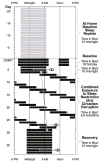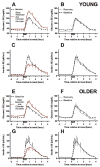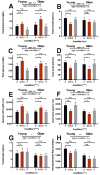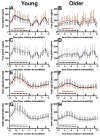Adverse metabolic consequences in humans of prolonged sleep restriction combined with circadian disruption
- PMID: 22496545
- PMCID: PMC3678519
- DOI: 10.1126/scitranslmed.3003200
Adverse metabolic consequences in humans of prolonged sleep restriction combined with circadian disruption
Abstract
Epidemiological studies link short sleep duration and circadian disruption with higher risk of metabolic syndrome and diabetes. We tested the hypotheses that prolonged sleep restriction with concurrent circadian disruption, as can occur in people performing shift work, impairs glucose regulation and metabolism. Healthy adults spent >5 weeks under controlled laboratory conditions in which they experienced an initial baseline segment of optimal sleep, 3 weeks of sleep restriction (5.6 hours of sleep per 24 hours) combined with circadian disruption (recurring 28-hour "days"), followed by 9 days of recovery sleep with circadian re-entrainment. Exposure to prolonged sleep restriction with concurrent circadian disruption, with measurements taken at the same circadian phase, decreased the participants' resting metabolic rate and increased plasma glucose concentrations after a meal, an effect resulting from inadequate pancreatic insulin secretion. These parameters normalized during the 9 days of recovery sleep and stable circadian re-entrainment. Thus, in humans, prolonged sleep restriction with concurrent circadian disruption alters metabolism and could increase the risk of obesity and diabetes.
Figures





References
-
- Spiegel K, Leproult R, Van Cauter E. Impact of sleep debt on metabolic and endocrine function. Lancet. 1999;354:1435–1439. - PubMed
-
- Punjabi NM, et al. Sleep-disordered breathing, glucose intolerance, and insulin resistance: the Sleep Heart Health Study. American Journal of Epidemiology. 2004;160:521–530. - PubMed
Publication types
MeSH terms
Substances
Grants and funding
LinkOut - more resources
Full Text Sources
Other Literature Sources
Medical

